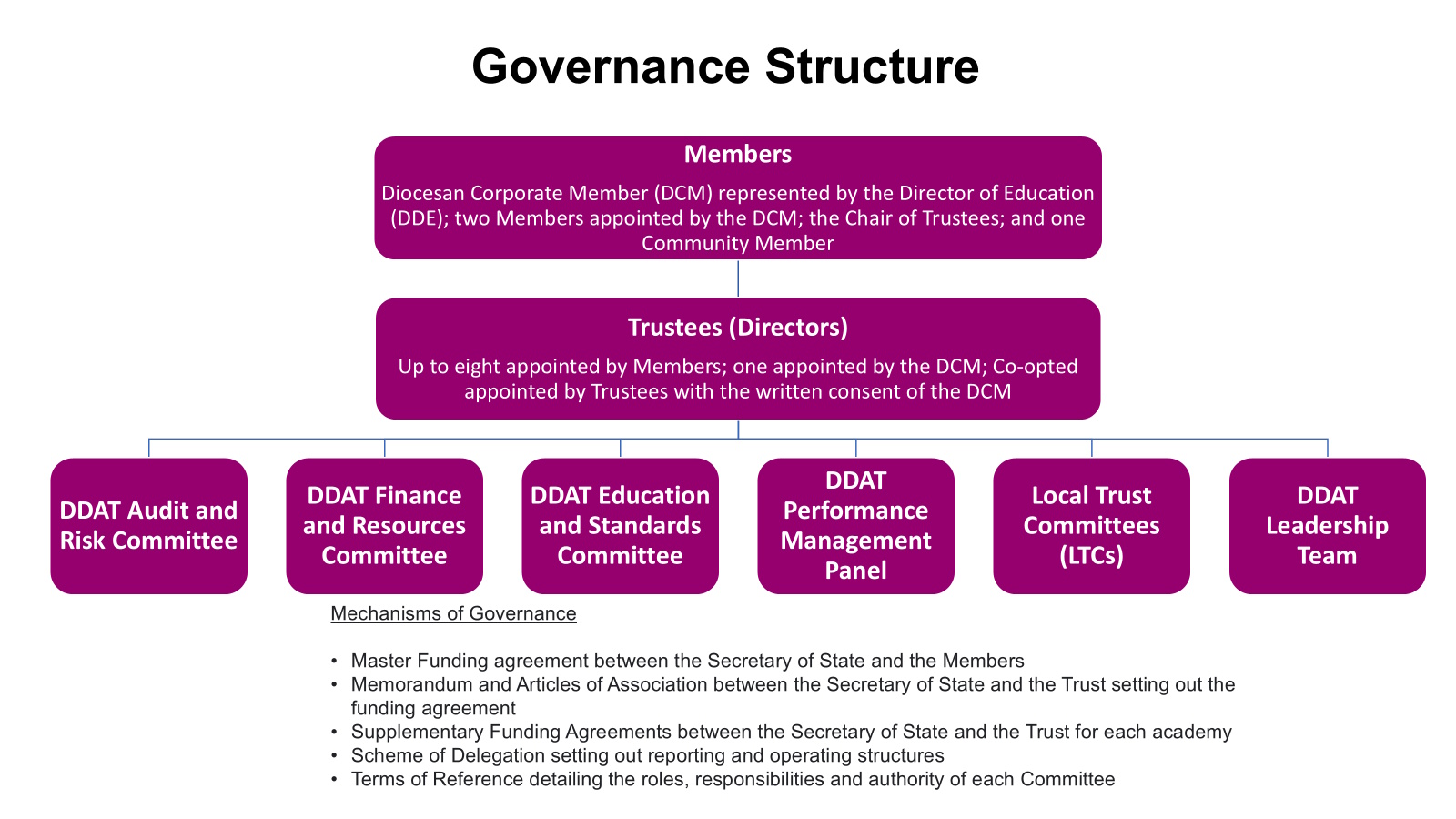Governance
Governance within DDAT is the framework guiding decision-making, accountability and stewardship of public funds. It is based on shared values and roles outlined in the DDAT Scheme of Delegation. Members, Trustees, and Committees work together to fulfil the DDAT’s mission. Effective governance is supported by:
The Members: The guardians of governance. Members have a strategic ‘eyes on, hands off’ role. Members’ key responsibilities include:
- Holding the Board of Trustees to account
- Appointing or removing Members and Trustees
- Amending the Articles of Association
- Appointing the Trust’s auditors and receiving the audited annual accounts
- Ensuring that the religious character of church academies is preserved and developed.
The Board of Trustees: The Trustees, also known as Directors, who sit on the Board are primarily voluntary, non-executive Trustees selected for the knowledge, skills and expertise they can bring to benefit the Trust and they serve a 4-year term of office. Some Trustee roles are ex-officio, as defined in DDAT’s Articles of Association, however the postholders are not obliged to accept a position on the Board.
The Board provides strategic leadership; accountability and assurance; and engagement. The Board is responsible for the strategic oversight and performance of the Trust and its academies. It holds legal accountability for all aspects of operational delivery and is required to have systems to assure itself of the quality, safety and good practice of the affairs of the Trust.
Board Committees: The Board has established committees under its delegated authority to facilitate review, scrutiny and discussion, and to ensure the Board has sufficient understanding and oversight of key areas. The Board Committees comprise:
- The DDAT Audit and Risk Committee
- The DDAT Finance and Resources Committee
- The DDAT Education and Standards Committee
- The DDAT Performance Management Panel
Details of the committee roles are set out within the Terms of Reference for each committee which are available in the Key Information section below.
Local Trust Committee’s (LTC’s): work at local level to provide support, to monitor and to challenge educational experience and performance. They engage with key stakeholders, including the local community and the church, and support alignment with DDAT’s strategy, approach, ethos and values.
The Trust Governance Professional and Company Secretary is Jason Hampton email: jason.hampton@ddat.org.uk telephone: 0333 3554353.
In this section
Governance Structure
Mechanisms of Governance
- Master Funding agreement between the Secretary of State and the Members
- Memorandum and Articles of Association between the Secretary of State and the Trust setting out the funding agreement
- Supplementary Funding Agreements between the Secretary of State and the Trust for each academy
- Scheme of Delegation setting out reporting and operating structures
- Terms of Reference detailing the roles, responsibilities and authority of each Committee
Members
The following are the current Members of the Trust. Ex-officio Members serve by virtue of their role:
- The Derby Diocesan Board of Education, Diocesan Corporate Member (DCM), represented by Elizabeth (Liz) Seymour as the Interim Director of Education (DDE)
- William Hagger, Diocesan Secretary for the Diocese of Derby, appointed by the DCM
- The Rt Revd Malcolm Macnaughton, Chair of the Derby Diocesan Board of Education, appointed by the DCM
- Dr Sarah Louise Hardman Charles, ex-officio as the Chair of the DDAT Board of Trustees
Trustees
The DDAT Board comprises Member appointed Trustees, a DCM appointed Trustee and Co-opted Trustees. All Trustees serve a 4-year term.
- Dr Sarah Hardman Charles (Member appointed), Chair of Trustees and Chair of the Education and Standards Committee
- Mark Emly (Member appointed), Safeguarding and SEND Link Trustee
- Dr Helen Galbraith (Co-opted), Careers Link Trustee
- John Kelly (Member appointed), Vice Chair of Trustees, and Chair of the Audit and Risk Committee
- Sharron Philpot (Member appointed)
- Peter Upton (Member appointed)
- Susan Whyld (DCM appointed)
- (Christopher) Justin Wilson (Member appointed), Chair of the Finance and Resources Committee
- Karen Beamish (Co-opted)
- Robert Atkins (Member appointed)
- Kevin Downs (Member appointed)
The names of Trustees serving over the last 12 months are:
- Henry Taylor-Toone, Trustee – resigned 10th February 2025
Scheme of Delegation
Local Governance - Local Trust Committee Chair information
Local Governance - School links
For details of Local Governors please select from the list below:
All Saints CofE Infants & Juniors
Bishop Lonsdale CofE Primary School
Bishop Pursglove CofE Primary School
Christ Church CofE Primary School
Darley Churchtown CofE Primary School
Marston Montgomery Primary School
Sale & Davys CofE Primary School
St George’s CofE Primary School
St Giles CofE Primary School (Killamarsh)
St Giles CofE Primary School (Matlock)
St Laurence CofE Primary School
St Werburgh’s CofE Primary School
Stanley Common CofE Primary School
Walter Evans CofE Primary School
Key Information
With effect from 1st February 2024, DDAT and DDAT2 merged to form one unified Trust. DDAT2 has now been dissolved and all schools transferred to DDAT. Relevant key information is displayed below for DDAT.
DDAT
- Articles of Association
- Register of Interests
- Register of Members
- Trustee Attendance Record 2022-23
- Trustee Attendance Record 2023-24
- Trustee Attendance Record 2024-25
- DDAT Chairs Forum Terms of Reference 2024 July 2024
- Education and Standards Committee Terms of Reference
- Audit and Risk Committee Terms of Reference
- Finance and Resources Committee Terms of Reference
- DDAT Code of Conduct Trustees and Local Academy Commitees
Meeting Agendas and Minutes
Meeting agendas, minutes, reports, documents or other papers considered at meetings can be provided on request.

